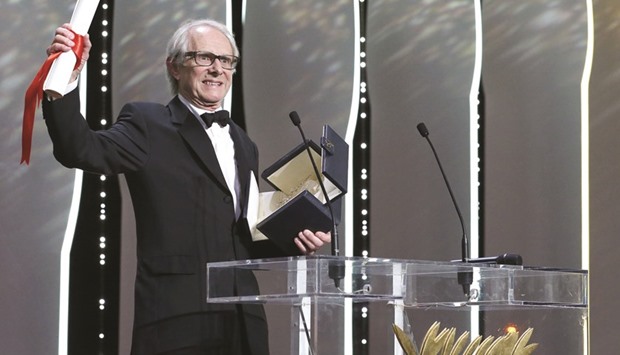British director Ken Loach won the Palme d’Or top prize at Cannes yesterday for the second time in a decade with his moving drama I, Daniel Blake about the shame of poverty in austerity-hit Europe.
The award marked a major upset at the world’s top film festival in favour of the left-wing director, who turns 80 this year and is known for shining a light on the downtrodden.
He beat out runaway favourites including the rapturously received German comedy Toni Erdmann by Maren Ade, one of three women directors in competition, and US indie legend Jim Jarmusch’s Paterson starring Adam Driver as a poetry-writing bus driver.
Both left empty-handed.
Loach now joins an elite club of two-time victors at the French Riviera festival including Luc and Jean-Pierre Dardenne and Emir Kusterica.
“We must give a message of hope – we must say another world is possible,” Loach said as he accepted the prize.
The runner-up Grand Jury prize went to Canadian wunderkind director Xavier Dolan, 27, for his hot-tempered family drama It’s Only the End of the World, featuring a cast of A-list French stars which had been widely panned by critics.
Britain also claimed the third-place Jury prize, for Andrea Arnold’s high-energy American Honey, starring Shia LaBeouf in a tale of disadvantaged youths selling magazines door-to-door in the US.
The best director prize was shared by Romania’s Cristian Mungiu for his drama Graduation about the moral rot of corruption in a post-communist society, and France’s Olivier Assayas for his supernatural thriller Personal Shopper with Hollywood phenomenon Kristen Stewart.
Philippine star Jaclyn Jose won best actress for her mesmerising performance in Brillante Mendoza’s Ma’ Rosa as a mother selling drugs to survive who falls prey to corrupt police.
Iran’s Shahab Hosseini clinched best actor for Asghar Farhadi’s taut moral drama The Salesman, about a married couple thrown into turmoil after the wife is attacked in their home.
Farhadi also scooped the screenplay honours.
Hosseini had also starred in Farhadi’s breakout success, 2011’s A Separation, which won an Oscar for best foreign language film.
Divines, a drama about a French teenage girl from an immigrant suburb who dreams of getting rich quick, got the nod for best first film, the Camera d’Or.
Directed by Houda Benyamina, it starred her sister Oulaya Amamra.
The nine-member jury was chaired by Mad Max director George Miller, who called the 12-day festival “one of the most intense experiences of my life”.
I, Daniel Blake moved many to tears at Cannes but drew mixed reviews.
It tells of a carpenter’s Kafkaesque struggle to get benefits in Britain’s shrinking welfare state after suffering a heart attack and being told by doctors he can no longer work.
He finds himself in a Catch-22 when an invisible and oft-cited “decision-maker” rules he is too healthy for benefits.
Blake befriends a single mother of two sanctioned for being late to the benefits centre, leaving her with no money for food.
“The most vulnerable people are told their poverty is their own fault,” Loach told reporters.
US trade magazine Variety called it one of Loach’s finest films, “a drama of tender devastation ... and scalding and moving relevance”.
“It’s about something so much larger than bureaucratic cruelty (although it is very much about that). It captures a world – our world – in which the opportunity to thrive, or even just survive, is shrinking by the minute.”
Twenty-one films were vying for the Palme d’Or, which can give a film a powerful boost on international cinema markets.
It was the second year in a row for a big surprise on awards night at the festival, after French filmmaker Jacques Audiard’s migrant thriller Dheepan muscled past favourites to take the trophy.

Loach, the Palme d’Or award winner for his film I, Daniel Blake.
